 MyDogBreeds
MyDogBreeds Both Norfolk Terrier and Bearded Collie are originated from United Kingdom. Norfolk Terrier may grow 29 cm / 11 inches shorter than Bearded Collie. Norfolk Terrier may weigh 21 kg / 46 pounds lesser than Bearded Collie. Both Norfolk Terrier and Bearded Collie has same life span. Norfolk Terrier may have less litter size than Bearded Collie. Norfolk Terrier requires Moderate maintenance. But Bearded Collie requires High maintenance
Both Norfolk Terrier and Bearded Collie are originated from United Kingdom. Norfolk Terrier may grow 29 cm / 11 inches shorter than Bearded Collie. Norfolk Terrier may weigh 21 kg / 46 pounds lesser than Bearded Collie. Both Norfolk Terrier and Bearded Collie has same life span. Norfolk Terrier may have less litter size than Bearded Collie. Norfolk Terrier requires Moderate maintenance. But Bearded Collie requires High maintenance
 It was in the 1880s that a working terrier was developed in eastern England. The Norfolk Terrier was developed by crossing local terrier-like dogs with the Irish Terrier breed as well as small red terriers.
It was in the 1880s that a working terrier was developed in eastern England. The Norfolk Terrier was developed by crossing local terrier-like dogs with the Irish Terrier breed as well as small red terriers.
Known first as the Cantab Terrier and then later as the Trumpington Terrier, the name changed further but in 1932, the Norwich was accepted into the English Kennel Club and the first written standard was created.
The Norfolk Terrier was recognized by the United Kennel Club in 1979. It has gained recognition as an independent breed but is a variety of the Norwich Terrier, distinguished from it by having floppy ears and not erect ears. Both the Norfolk- and Norwich are the smallest of the working terriers.
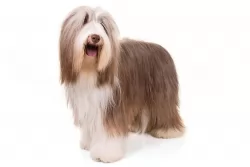 This long-haired herding breed was bred by mixing the two sheepdog breeds: the Scottish dogs and the Polish sheepdogs. The Bearded Collie gained the popularity during the last century by winning some of the Dog Shows. This friendly dog with the beautiful coat is surely one of the most specific pets. Nowadays, the Bearded Collie is very popular. The organizations for breeding, saving, rescuing and adopting this breed can be found in the USA.
This long-haired herding breed was bred by mixing the two sheepdog breeds: the Scottish dogs and the Polish sheepdogs. The Bearded Collie gained the popularity during the last century by winning some of the Dog Shows. This friendly dog with the beautiful coat is surely one of the most specific pets. Nowadays, the Bearded Collie is very popular. The organizations for breeding, saving, rescuing and adopting this breed can be found in the USA.
 The Norfolk Terrier is a small purebred dog, standing at 23 to 25cm in height and weighing roughly between 4.5kg and 6kg. The dog has a wire-haired coat which can be in different colors such as wheaten, red, black and grey or grizzle.
The Norfolk Terrier is a small purebred dog, standing at 23 to 25cm in height and weighing roughly between 4.5kg and 6kg. The dog has a wire-haired coat which can be in different colors such as wheaten, red, black and grey or grizzle.
The hair on his head and ears is shorter and smoother and he has longer whiskers and eyebrows. The chest is deep, the front legs are short and straight and the tail has always been docked to half its length but left long these days. The tail is set high and carried erect.
Norfolks are feisty, fearless dogs with an independent streak. They’re gentle though, and when it comes to being a companion dog, they get on well with children and other pets. They thrive on their human family’s companionship and wouldn’t do well at all if they were constantly left outside.
They’re not yappy dogs but will bark occasionally so he can sound the alarm if strangers approach.
This little dog is able to live in the city or the countryside, but just because he is little, you can’t neglect his exercise needs. He will most certainly need to be exercised every day and taken for walks as he is an energetic, lively dog. He is intelligent too and easy to train and socialize, turning him into such an obedient, pleasurable pet.
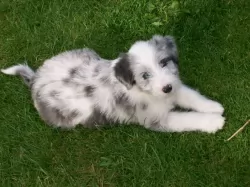 The Beardie is easy to recognize because of the longer hairs on the cheeks, chin and under the lower lip. This medium-sized Bouncing Beardie is usually the great family pet because he is very friendly and loving. This breed is extremely active and they are energetic despite their longer bodies. They grow up to have more than one coat colour, but they are all born one coloured. They always have white or cream markings. This smart dog can be very stubborn and independent, if you keep your dog in a yard, he will use every chance to escape.
The Beardie is easy to recognize because of the longer hairs on the cheeks, chin and under the lower lip. This medium-sized Bouncing Beardie is usually the great family pet because he is very friendly and loving. This breed is extremely active and they are energetic despite their longer bodies. They grow up to have more than one coat colour, but they are all born one coloured. They always have white or cream markings. This smart dog can be very stubborn and independent, if you keep your dog in a yard, he will use every chance to escape.
 Fearless and brave, the Norfolk Terrier promises to be a wonderful companion.
Fearless and brave, the Norfolk Terrier promises to be a wonderful companion.
They're social, loving dogs and want to be part of the household. He is lively and active too and wants to be included in your walks and your games. He loves nothing more than to be running across a field after a ball.
They’re such amicable pets that they make great dogs for first-time dog owners. Let him into your heart and your home – he makes such a splendid pet – that once you’ve had one, you’ll realize you can never be without such a wonderful pet and companion again.
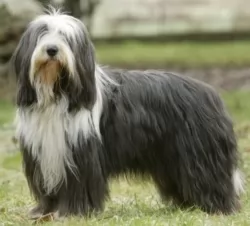 The Bouncing Beardie is great with children. They are very playful, jumpy and have generally very sweet and gentle personality. Children love them because they never get tired. If properly socialized, this dog can be the main attraction for any child.
The Bouncing Beardie is great with children. They are very playful, jumpy and have generally very sweet and gentle personality. Children love them because they never get tired. If properly socialized, this dog can be the main attraction for any child.
Herding, agility shows, obedience competitions, treibball, show dogs, trally...
This breed is very friendly. If your family is about to raise the Bearded Collie, prepare to have a pet that is highly affectionate and bonded with the members of the family. They don’t do well if left alone. They usually don’t bark and they are never destructible, but loneliness somehow triggers odd behaviour with this breed. They are not usually scared of strangers. If they are trained and socialized, you will be able to take your Beardie anywhere you go.
Some say that is very easy to train the Bearded Collie. The rule for this breed is to start the obedience training while they are very small. They are generally very independent, and they will try to do things in their own way. If you start your training early before your Beardie forms this kind of personality, you will have a wonderful pet.
 The life expectancy of your Norfolk Terrier is 8 to 14 years, but there are some who have received excellent care and who have reached 17 years of age.
The life expectancy of your Norfolk Terrier is 8 to 14 years, but there are some who have received excellent care and who have reached 17 years of age.
Just as with any other dog, they are prone to common dog illnesses, and these can include dental issues and mitral valve disease. They also are prone to hip dysplasia, and according to the Orthopedic Foundation for Animals (OFA) they are known for problematic hips.
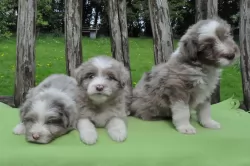 This breed is generally very healthy. They don’t have some major health issues. Some of the issues that are registered are:
This breed is generally very healthy. They don’t have some major health issues. Some of the issues that are registered are:
The degenerative disease that causes the blindness.
When the hormone produced by the thyroid gland is abnormally low.
That is generally the hereditary disease, can also be caused by bad diet or injuries.
To food, chemicals, pollen, dust...
That usually happens because of their dropped ears that are not very easy to clean.
 The Norfolk Terrier’s hard, wiry, straight coat requires being hand stripped about twice a year by hand or with a stripping knife. The paws will also need to be trimmed.
The Norfolk Terrier’s hard, wiry, straight coat requires being hand stripped about twice a year by hand or with a stripping knife. The paws will also need to be trimmed.
It is recommended to keep the hair short around the anus for hygienic purposes and the tail itself will need to be stripped.
The Norfolk doesn’t shed his coat naturally, and the hair keeps growing, making the dog uncomfortable and ungroomed looking. The dog will certainly need to have his hair kept away from around the eyes.
If you don’t want to strip your dog, there are people who take their dogs to professional groomers, but then this professional grooming makes it that the texture of the dog’s coat changes from wiry to soft.
Small dogs are prone to dental problems, so check your dog’s teeth regularly. A bad tooth can play havoc with your dogs general health.
As with any other dog, the Norfolk Terrier will do well on high-quality kibble, specially formulated for small dog breeds. For a tasty treat, boil some chicken and vegetables such as sweet potato, carrots and spinach in a pot, chop them up and add to his kibble with some brown rice and pasta. A tiny bit of raw meat added in occasionally is all this little dog needs to stay healthy and content.
Don’t ‘treat’ him by giving him chocolates, chips and peanuts. You will upset his stomach. Dogs do best on simply, healthy, tasty diets such as mentioned above. Make sure he has a constant supply of fresh, cool water.
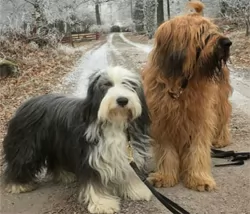 Raising your Bearded Collie pup on a high-quality food is usually enough for a puppy. Make sure that portions are appropriate for his age and weight. Once your pet is more than six months old, they will need only two meals per day. They get obese very easy. Don’t train them with the treats.
Raising your Bearded Collie pup on a high-quality food is usually enough for a puppy. Make sure that portions are appropriate for his age and weight. Once your pet is more than six months old, they will need only two meals per day. They get obese very easy. Don’t train them with the treats.
To care for your Bearded Collie, you must be aware of the grooming responsibilities that come with this longhaired pet. During the shedding period, it is required to brush them daily. Bathing is not a regular necessity but it will be easier to keep him clean and well groomed if you care about your pet all the time. Some people like to shorten the coat for their Beardie, and it is usually done during summer. Make sure to take him to regular ear, eye, teeth and hip vet checks.
The Bearded Collie is a breed that requires daily activity. They have very playful nature and they love to run, play and spend time outdoors. The best option will be a big yard so that Beardie can run for hours without the leash.